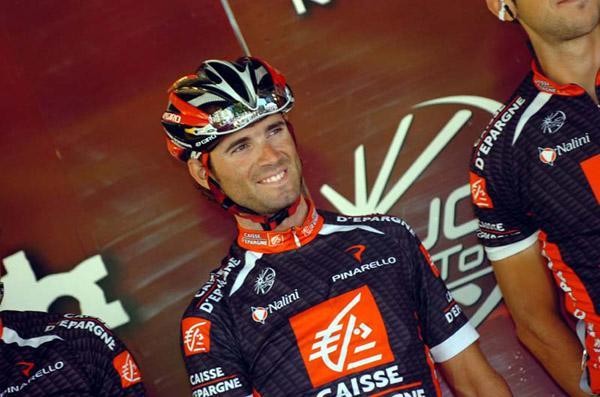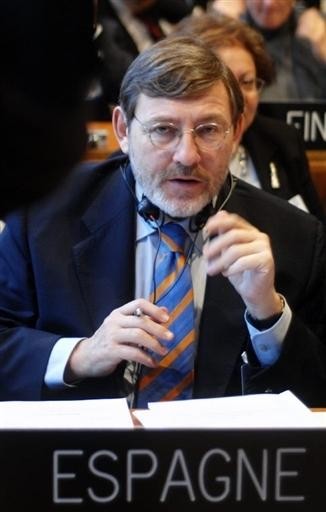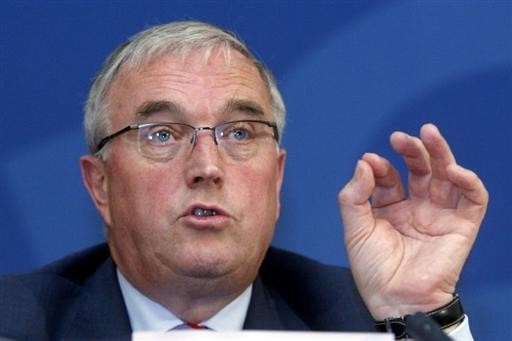McQuaid challenges Spanish to do DNA analysis
As the world road race championships draw ever closer, the UCI and the Spanish cycling federation...



News feature: September 20, 2007
One group believes there may be questions to be answered, others insist that the rider is innocent and being victimised. However there is a chance for Alejandro Valverde to clear his name and to perhaps ride the Worlds in Stuttgart. Will he take it? Cyclingnews' Shane Stokes reports.
As the world road race championships draw ever closer, the UCI and the Spanish cycling federation continue to be at loggerheads over the participation of Alejandro Valverde in Stuttgart. On Wednesday UCI President Pat McQuaid pointed out that there is an easy way to remove a major question mark hanging over Valverde, if he is indeed innocent of doping.
In an 'all cards on the table' move, the Irishman has called for DNA analysis of one of the blood bags seized under the Operación Puerto investigation, saying that if the Spaniard is in the clear, this would serve to show that bag number 18 - corresponding to the codename 'Valv. Piti' - has no connection to the Caisse d'Epargne rider.
Both the Spanish cycling federation and the country's President of Spain's Superior Council of Sports (CSD) Jaime Lissavetzky have recently backed Valverde, saying that they consider that there is no new evidence to suggest guilt.
However after reviewing the full 6,000 page dossier on the Operación Puerto case, the UCI sees things otherwise and feels there are enough grounds for further investigation. Valverde previously admitted working with Doctor Eufemiano Fuentes while with Kelme but insisted that he has never doped. There have however been persistent rumours that the Spaniard was indeed involved and that the blood bag may be his. In January the newspaper ABC printed details of the alleged link and in May, La Gazzetta dello Sport went further.
As reported earlier on Cyclingnews, UCI president Pat McQuaid recently sent a letter to Lissavetzky expressing his concern at the turn of affairs. It is known that he is frustrated that the rider has been publicly supported by such a high-profile figure, plus the Spanish federation, rather than being subjected to the requested investigation.
Get The Leadout Newsletter
The latest race content, interviews, features, reviews and expert buying guides, direct to your inbox!
WADA and the IOC were also sent a copy of the letter, and it is believed that the former has backed the UCI's position in the matter.
McQuaid said on Wednesday that there is a simple way to prove the rider's innocence if he is indeed telling the truth. "The information we have suggests that bag number 18 may belong to Alejandro Valverde," he told Cyclingnews. "If Jaime Lissavetzky is so concerned about things, then he should go and get it compared. That stops the arguments.
"It's simple. Get the DNA in bag number 18 compared to Valverde's DNA...if it comes out negative, then that clears him. That [the allegations about bag number 18] is one of the main elements that there is against him. The analysis is a simple thing to do. The Germans have done it, the Italians have done it, so why can't the Spanish do it?"
Willing to prove his innocence?
Alejandro Valverde was one of many riders who signed the UCI's 'Commitment for a New Cycling' prior to the start of the Tour de France. In doing so, he undertook to provide DNA if required. The UCI is thought to already have several samples of blood from him due to the health checks that have been carried out, and so one half of the DNA requirement is already available to be examined.
The other, blood bag number 18, is in the possession of those who have been carrying out the Operación Puerto investigation. The case has been in limbo ever since the investigating judge said that Fuentes appeared not to have broken the Spanish law which was in existence at the time; the UCI has appealed this decision, but there has been no indications as to if or when it might be resumed. However it is thought that Lissavetsky's influence would be enough to enable the comparison if the will was there.
For now, the only legal movement is the threat made by the Spanish cycling federation to take action over the decision not to allow Valverde to take part in the world championships. McQuaid said that any such action would be vigorously opposed by the UCI.
"They are talking about legal action in relation to Valverde. Their first choice is CAS [the Court of Arbitration for Sport] but they can't go directly to CAS, they need the UCI to agree to do it. I don't think we need to agree to that, but it is something that we would consider.
"They have legal recourse to either CAS or a Swiss court. It is up to them to decide what they want to do. But either way, we will certainly defend the position that we are in."
McQuaid's letter to Lissavetzky also reportedly voiced concerns about continued doping by some [unnamed] Spanish riders. He confirmed that the UCI is indeed suspicious that something is going on with some of them.
"When we look at the information that we have, it indicates that there is still a lot of doping activity going on in Spain," he stated. "The blood checks that we do can tell us a lot. There is an area of concern there. However we don't feel that the authorities in Spain are adequately concerned about this and are dealing with it."
Extra controls at the Worlds
Once country which is undeniably cooperating well with anti-doping initiatives is Germany, hosts to the upcoming world championships in Stuttgart. In recent days a strong collection of measures have been announced, including extra blood and urine controls plus the storing of samples for later testing for growth hormone use.
McQuaid said that these are being done in order to severely limit the chance of riders doping at the championships. "These have come about as a result of the meeting I had with the organisers of the worlds and with the German Minister of the Interior several weeks ago," he explained. "We agreed that a programme of anti-doping activity would be carried out prior to the world championships, with fairly heavy controls being done in order to ensure that the world championships are free of problems.
"Also, we agreed at that time as well that all of the teams riding the world championships would ask all of the riders taking part in the races to sign a document, something along the lines of the document that was signed before the Tour de France [the Riders's Commitment to a New Cycling]. Of course, for under 23 and women it will be a slightly different document than that for professional riders, but it is all a step in the right direction."
Indeed any such measures should help to boost confidence in those who will compete in Stuttgart. This document plus the additional tests are about removing doubt, eliminating any questions which might be hanging over some riders. Valverde is one who is under intense scrutiny; if he agrees to the DNA analysis, it would go a long way towards reassuring the UCI and the media that he was telling the truth all along about Fuentes. Will he do so? Time will tell, even if time is running out.